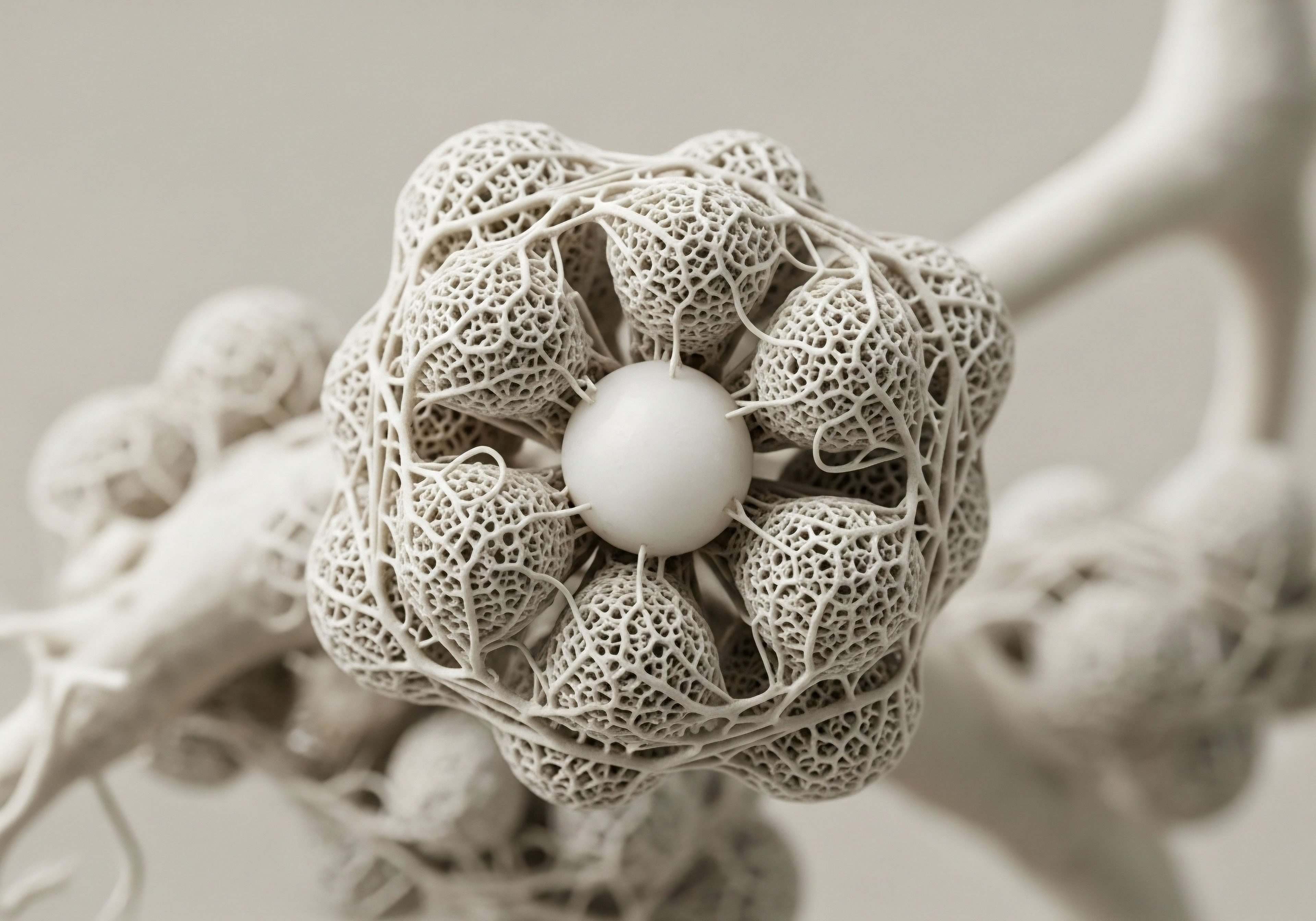

Fundamentals
Experiencing a shift in your vitality, particularly in areas as personal as sexual function, can bring about a sense of quiet concern. You might notice a subtle decline in desire, a change in the quality of erections, or a general feeling that your body’s once-reliable systems are no longer operating with the same vigor.
This experience is not uncommon, and it often signals deeper biological conversations occurring within your body, particularly within the intricate network of your hormonal systems. Understanding these internal dialogues offers a path toward reclaiming your inherent physiological capabilities.
The human body operates through a sophisticated communication network, where tiny messenger molecules orchestrate a vast array of functions. Among these messengers, peptides play a significant role. Peptides are short chains of amino acids, the building blocks of proteins. They act as signaling molecules, instructing cells and tissues to perform specific tasks.
Unlike larger proteins, their smaller size allows for precise and targeted actions within biological systems. This precision makes them compelling subjects in the pursuit of optimizing health and restoring function.
Consider the broader context of the endocrine system, a collection of glands that produce and release hormones directly into the bloodstream. These hormones regulate nearly every aspect of your health, from metabolism and growth to mood and, crucially, sexual function. When this system functions optimally, a harmonious balance supports robust physiological processes. However, disruptions in this delicate equilibrium can manifest as various symptoms, including those affecting sexual well-being.
Peptides are precise biological messengers, influencing cellular functions and offering a pathway to restore physiological balance.
The decline in sexual quality often correlates with changes in hormonal output, a natural occurrence with advancing age or due to various health conditions. For instance, a reduction in circulating testosterone, a key androgen in both men and women, can directly impact libido and erectile quality.
Similarly, the complex interplay of other hormones and signaling molecules, many of which are peptides, contributes to the overall landscape of sexual health. Exploring how specific peptides interact with these systems provides a unique lens through which to view and address these concerns.
The focus here extends beyond simply addressing symptoms; it involves a deeper appreciation of the biological mechanisms that underpin your lived experience. By understanding the foundational roles of peptides and the endocrine system, individuals can begin to grasp the scientific rationale behind personalized wellness protocols aimed at restoring vitality and function. This journey begins with recognizing the body’s inherent capacity for self-regulation and the potential of targeted interventions to support that capacity.


Intermediate
As we move beyond the foundational understanding of peptides, the discussion shifts to specific clinical protocols and their mechanisms of action, particularly concerning erectile quality and overall sexual function. These interventions aim to recalibrate biological systems, supporting the body’s innate ability to achieve optimal performance. The precise application of certain peptides can influence neural pathways, hormonal balance, and tissue health, all of which are integral to robust sexual vitality.

Targeted Peptide Applications for Sexual Health
One peptide that has garnered considerable attention for its direct impact on sexual function is PT-141, also known as Bremelanotide. Unlike conventional treatments that primarily increase blood flow to the penis, PT-141 operates centrally, within the brain. It functions as a melanocortin receptor agonist, specifically targeting the MC4 receptor in the hypothalamus, a brain region central to sexual response.
By activating these receptors, PT-141 triggers a cascade of neural signals, including the release of dopamine, a neurotransmitter associated with desire and arousal. This central action means PT-141 can address aspects of sexual dysfunction related to low desire or psychological factors, in addition to physical responses. It has shown efficacy in both men and women, with studies indicating improvements in sexual desire and arousal.
PT-141 acts on brain receptors to stimulate sexual desire and arousal, offering a distinct approach from blood flow-centric treatments.
Another class of peptides, known as Growth Hormone Secretagogues (GHSs), indirectly influence sexual health by optimizing overall physiological function. These include compounds such as Sermorelin, Ipamorelin, CJC-1295, Tesamorelin, and Hexarelin. These peptides stimulate the pituitary gland to increase the natural production and release of Growth Hormone (GH) and Insulin-like Growth Factor 1 (IGF-1). While their primary applications span anti-aging, muscle gain, and fat loss, the systemic improvements they facilitate can significantly contribute to sexual well-being.
- Sermorelin ∞ A synthetic analog of Growth Hormone-Releasing Hormone (GHRH), it encourages the pituitary gland to secrete GH naturally. Benefits include improved sleep, increased energy, and enhanced physical performance, which can collectively support libido.
- Ipamorelin ∞ This GHS selectively stimulates GH release without significantly affecting other hormones like cortisol, leading to fewer side effects. It works synergistically with CJC-1295 to amplify GH production.
- CJC-1295 ∞ Designed to extend the half-life of naturally secreted GH, CJC-1295 provides a sustained increase in GH and IGF-1 levels. This can lead to improved muscle mass, reduced fat, and a stronger cardiovascular system, all of which can indirectly aid sexual function.
- MK-677 (Ibutamoren) ∞ An orally active GHS, MK-677 mimics ghrelin to stimulate GH and IGF-1. Research suggests it can improve libido by increasing testosterone and estrogen levels, and by boosting nitric oxide, which is vital for erectile quality.
The optimization of GH levels through these peptides can lead to a healthier body composition, increased energy, and improved sleep quality, all factors that contribute to a more robust sexual drive and function. A body operating at its peak often experiences a natural resurgence in its capacity for intimacy.

Hormonal Optimization Protocols
Beyond peptides that directly stimulate sexual response or growth hormone, broader hormonal optimization protocols, such as Testosterone Replacement Therapy (TRT), play a foundational role in addressing sexual dysfunction.

Testosterone Replacement Therapy for Men
For men experiencing symptoms of low testosterone, such as reduced libido, decreased energy, and changes in erectile quality, TRT can be a transformative intervention. Administering exogenous testosterone helps restore circulating levels to an optimal range. While some studies indicate that TRT alone may have limited direct effects on erectile function unless testosterone levels are significantly low, it consistently improves sexual desire and overall satisfaction for many men.
A standard protocol often involves weekly intramuscular injections of Testosterone Cypionate. To mitigate potential side effects and maintain endogenous production, adjunctive medications are frequently included:
- Gonadorelin ∞ This synthetic peptide hormone acts as a GnRH agonist, stimulating the pituitary gland to release Luteinizing Hormone (LH) and Follicle-Stimulating Hormone (FSH). This helps maintain natural testosterone production and preserves fertility, preventing testicular atrophy often associated with TRT.
- Anastrozole ∞ An aromatase inhibitor, Anastrozole reduces estrogen levels by blocking the conversion of testosterone to estrogen. This helps manage potential side effects like gynecomastia and water retention, ensuring a balanced hormonal environment.
- Enclomiphene ∞ This selective estrogen receptor modulator (SERM) can support LH and FSH levels, further aiding in the maintenance of natural testosterone production and fertility, particularly for men seeking to preserve reproductive capacity.
These combined approaches aim to optimize testosterone levels while safeguarding other aspects of male reproductive health, providing a more holistic solution to sexual function concerns.

Testosterone Replacement Therapy for Women
Testosterone also plays a vital role in female sexual health, influencing libido, energy, and mood. For pre-menopausal, peri-menopausal, and post-menopausal women experiencing symptoms like low libido, testosterone therapy can be considered. Protocols typically involve low-dose subcutaneous injections of Testosterone Cypionate or the use of long-acting pellet therapy.
The inclusion of Progesterone is often based on menopausal status, supporting overall hormonal balance, especially in women with a uterus. While testosterone therapy for women is often prescribed off-label for low sexual desire, clinical experience and some studies indicate its potential to significantly enhance sexual function and overall quality of life.
Hormonal optimization, including TRT for men and women, aims to restore systemic balance, supporting sexual desire and function.
The table below summarizes the primary actions of key peptides and hormones on sexual function:
| Agent | Primary Mechanism of Action | Impact on Sexual Function |
|---|---|---|
| PT-141 (Bremelanotide) | Activates central melanocortin receptors (MC4R) | Increases sexual desire and arousal, can induce erection |
| Sermorelin, Ipamorelin, CJC-1295 | Stimulate endogenous Growth Hormone (GH) release | Indirectly improves libido, energy, and overall vitality |
| MK-677 (Ibutamoren) | Ghrelin receptor agonist, increases GH/IGF-1 | Enhances libido, supports erectile quality via nitric oxide and hormone balance |
| Testosterone (Men) | Direct androgenic effects on tissues and central nervous system | Increases libido, improves erectile quality (especially if deficient) |
| Testosterone (Women) | Androgenic effects on desire, energy, and mood | Boosts libido, improves sexual arousal and satisfaction |
| Gonadorelin | GnRH agonist, stimulates LH/FSH release | Maintains natural testosterone production and fertility in men on TRT |
These targeted interventions, whether direct peptide therapies or broader hormonal recalibrations, illustrate a sophisticated understanding of the body’s systems. They represent a departure from simplistic approaches, favoring a precise, evidence-based strategy to restore and optimize sexual health.


Academic
The exploration of how peptides influence erectile quality and overall sexual function requires a deep dive into the intricate endocrinological and neurobiological pathways that govern these processes. Sexual function is not an isolated phenomenon; it is a complex orchestration involving the central nervous system, peripheral vascular dynamics, and a delicate balance of hormonal signals. Understanding these interconnected systems provides a comprehensive view of how targeted peptide interventions can exert their effects.

The Hypothalamic-Pituitary-Gonadal Axis and Peptides
At the core of reproductive and sexual health lies the Hypothalamic-Pituitary-Gonadal (HPG) axis. This axis functions as a critical feedback loop, regulating the production of sex hormones. The hypothalamus, a region in the brain, initiates this cascade by releasing Gonadotropin-Releasing Hormone (GnRH) in a pulsatile manner. This GnRH then travels to the anterior pituitary gland, stimulating the release of two key gonadotropins ∞ Luteinizing Hormone (LH) and Follicle-Stimulating Hormone (FSH).
In men, LH acts on the Leydig cells in the testes to stimulate testosterone synthesis, while FSH supports spermatogenesis in the Sertoli cells. In women, LH and FSH regulate ovarian function, including estrogen and progesterone production, which are vital for libido and arousal. Disruptions anywhere along this axis can lead to hormonal imbalances that compromise sexual function.
Peptides can modulate this axis at various points. For instance, Gonadorelin, a synthetic analog of GnRH, directly stimulates the pituitary to release LH and FSH. This is particularly relevant in contexts like Testosterone Replacement Therapy (TRT), where exogenous testosterone can suppress the natural HPG axis, leading to testicular atrophy and impaired fertility. By introducing Gonadorelin, the pulsatile stimulation of the pituitary can be maintained, preserving testicular function and endogenous testosterone production, thereby supporting long-term sexual health and fertility.

Neurobiological Mechanisms of Peptides in Sexual Response
Beyond the direct hormonal regulation of the HPG axis, several peptides exert their influence through neurobiological pathways, directly affecting desire and arousal at the central nervous system level.

Melanocortin System Modulation
PT-141 (Bremelanotide) stands as a prime example of a centrally acting peptide. Its mechanism involves the activation of melanocortin receptors, particularly the MC4 receptor, located in specific brain regions like the hypothalamus. This activation leads to an increase in dopamine release in areas associated with sexual desire and reward.
Dopamine is a crucial neurotransmitter in the brain’s reward system, playing a significant role in motivation and pleasure, including sexual arousal. The ability of PT-141 to initiate erections without direct physical stimulation, by “flipping a switch” in the brain, distinguishes its action from peripheral vasodilators. This makes it particularly useful for individuals whose sexual dysfunction has a significant central or psychological component.

Growth Hormone Axis and Nitric Oxide Signaling
The growth hormone secretagogues (GHSs) like MK-677, Sermorelin, and Ipamorelin/CJC-1295, while primarily known for their effects on body composition and metabolism, also contribute to sexual function through systemic improvements. Elevated GH and IGF-1 levels can lead to increased lean muscle mass, reduced adiposity, and improved energy levels, all of which indirectly support sexual vitality.
Furthermore, MK-677 has been shown to increase nitric oxide (NO) levels. Nitric oxide is a critical signaling molecule in the vascular system, playing a central role in the physiological process of penile erection. Sexual stimulation triggers the release of NO from nerve endings and endothelial cells in the penis, leading to the relaxation of smooth muscle in the penile arteries and cavernous bodies.
This relaxation allows for increased blood flow, resulting in an erection. By supporting NO production, MK-677 can contribute to improved erectile quality.

Tissue Repair and Regenerative Peptides
The integrity of vascular and connective tissues is fundamental to erectile function. Peptides with regenerative properties can therefore offer supportive benefits. Pentadeca Arginate (PDA), a derivative of BPC-157, exemplifies this category. PDA is recognized for its ability to enhance tissue repair, reduce inflammation, and promote angiogenesis (the formation of new blood vessels).
The mechanisms of PDA include:
- Enhanced Nitric Oxide Production ∞ PDA supports NO synthesis, which is crucial for cardiovascular health and tissue oxygenation, directly benefiting blood flow to sexual organs.
- Angiogenesis ∞ By promoting the formation of new blood vessels, PDA improves circulation to damaged or stressed tissues, accelerating healing. This can be particularly relevant for microvascular health in the penile tissue.
- Extracellular Matrix Protein Synthesis ∞ PDA supports the production of structural proteins that form the foundation of healthy tissues. This contributes to the resilience and integrity of the corpus cavernosum and surrounding structures.
While PDA is primarily applied for injury recovery and general tissue health, its systemic effects on vascularity and tissue integrity can indirectly support erectile function by optimizing the underlying physiological environment.
The HPG axis, neurobiological pathways, and tissue integrity are interconnected systems, all influenced by specific peptides to support sexual function.
The interplay of these peptides within the broader endocrine and neurological systems highlights a sophisticated understanding of sexual health. It moves beyond a singular focus on blood flow to encompass desire, hormonal balance, and tissue resilience.
A deeper understanding of the molecular targets and systemic effects of these peptides allows for a more precise and personalized approach to addressing concerns related to erectile quality and overall sexual function. This scientific precision, combined with an empathetic understanding of the individual’s experience, forms the bedrock of effective wellness protocols.

References
- Dinsmore, C. E. & Alderdice, M. T. (2003). PT-141 ∞ a melanocortin agonist for the treatment of sexual dysfunction. Annals of the New York Academy of Sciences, 994, 96-102.
- Diamond, D. D. & Goldstein, I. (2025). Intravenous peptides and amino acids for erectile dysfunction ∞ a narrative review of current applications and future directions. Expert Opinion on Pharmacotherapy, 26(5), 631-637.
- Another Day Pharma. (2025, May 22). Another Day Pharma announces successful Phase II trial results for BZ371A in post-prostatectomy erectile dysfunction. Pharmafile.
- Preston’s Pharmacy. (2025, June 27). Sexual Dysfunction ∞ Bremelanotide Can Help.
- Performance Rejuvenation Center. (n.d.). Peptide Therapy for Washington, DC.
- Genemedics. (2024, January 30). MK 677 Ibutamoren Guide 2023 ∞ Benefits, Results, Side Effects.
- Prometheuz HRT. (2024, September 17). Benefits of Gonadorelin in Testosterone Replacement Therapy.
- Strive Pharmacy. (n.d.). Gonadorelin.
- LIVV Natural. (n.d.). TRT and Fertility ∞ How to Maintain Fertility While on Testosterone Therapy.
- Wilt, T. J. et al. (2024). Testosterone replacement in men with sexual dysfunction. Cochrane Database of Systematic Reviews, (1).
- WebMD. (2024, May 3). Testosterone Replacement Therapy ∞ Injections, Patches, and Gels.
- Newson, L. (2024, April 2). The importance of testosterone for women. Dr Louise Newson.
- Amazing Meds. (2025, February 20). What is Pentadeca Arginate? Uses, Benefits, and How to Get It.
- Men’s Health Boston. (n.d.). Peptide Therapy.
- Cleveland Clinic. (n.d.). Endocrine System ∞ What It Is, Function, Organs & Diseases.

Reflection
Your personal health journey is a dynamic process, one that invites continuous understanding and proactive engagement. The insights shared here regarding peptides, hormonal health, and sexual function are not merely academic facts; they represent a framework for understanding your own biological systems. Recognizing the intricate connections between your endocrine balance, neurobiological signals, and tissue health empowers you to approach any concerns with informed perspective.
This knowledge serves as a starting point, a foundation upon which to build a personalized strategy for reclaiming vitality. Each individual’s biological landscape is unique, and what works for one person may require careful adjustment for another. The path toward optimal well-being is often iterative, involving careful assessment, targeted interventions, and consistent monitoring.
Consider this information as a guide to initiating deeper conversations with healthcare professionals who specialize in hormonal optimization and personalized wellness. Your lived experience, combined with precise clinical data, forms the most complete picture of your health. The goal is to move beyond simply managing symptoms, instead aiming to restore the underlying physiological harmony that supports a full and functional life.
Your body possesses an inherent intelligence, and by aligning with its natural rhythms and needs, you can unlock its potential for sustained health and robust function.



